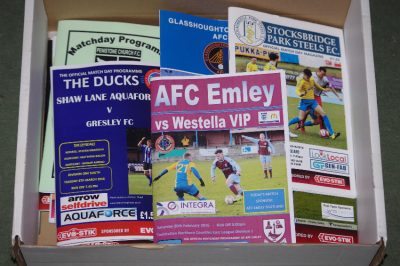
Match day programmes were once an essential item for football supporters
Match-day programmes were once the essential item for football supporters, for some they still are.
But, for anyone involved in the semi-professional game though, it can be the bane of their lives.
By league rules, clubs have no choice, they have to publish one, but many club officials will be able to testify that the position of programme editor can be the hardest to fill. There are some fantastic programme editors across the region who produce excellent publications. However, other clubs struggle to match the quality, simply because the person responsible has to do multiple jobs because of a lack of volunteers. Are programmes worth the time and effort? In some cases, yes.
How many shall we print is a regular question and clubs are dammed either way. Predicting crowds is a difficult task. Clubs are condemned if they print 50, but 70 people want them and they quickly sell out. If they think 50 is sufficient, but only ten people buy one, the club is left to pick the cost and are stuck with a box of unsold programmes. Numerous club shops across the region prove that hundreds of programmes don’t get sold every season. If just ten people read a particular copy, was the effort of putting it together worth it? These are real issues for clubs at the bottom end of the spectrum.
Cost is also a major issue, whether the programme is professionally printed or a DIY publication, because making a profit on programmes is difficult. Even if the programme is homemade there are still paper and ink cartridge costs. Clubs do sell advertising space to pay for some of the cost, but not all are successful in covering the shortfall.
If there is a need for a printed publication then maybe a monthly magazine by every club – instead of a programme – would serve a better purpose as it could be used as commercial advertising tool. Allowing clubs to do this would not be unprecedented either. A few years ago, the Evo Stik League made the extraordinary decision to allow Radcliffe Borough to produce a monthly magazine instead of a match-day programme.
Alternatively and more radically, producing an online programme would eradicate printing costs, and enable clubs to keep selling advertising space. Although they still have to print hard copies, a few clubs do publish their programmes online to great success.
Programmes of old, certainly in Non League, were a key source of information for supporters. Times have changed and that necessity is more-or-less gone because of the advent of the Internet and Social Media. Supporters find out who has signed for their club either from the respective official website, Facebook or Twitter.
Most spectators at the lower steps are more bothered about the names of the players turning out. What the vast majority, certainly in the Evo Stik and NCEL, actually want is a team-sheet, not a programme. Secretaries are regularly harassed for team sheets, regardless of whether the line-ups are on Twitter or not.
Surely printing team-sheets could be made a league requirement in the Evo Stik and NCEL, with publishing a programme being made optional. Some clubs would welcome this kind of opportunity.